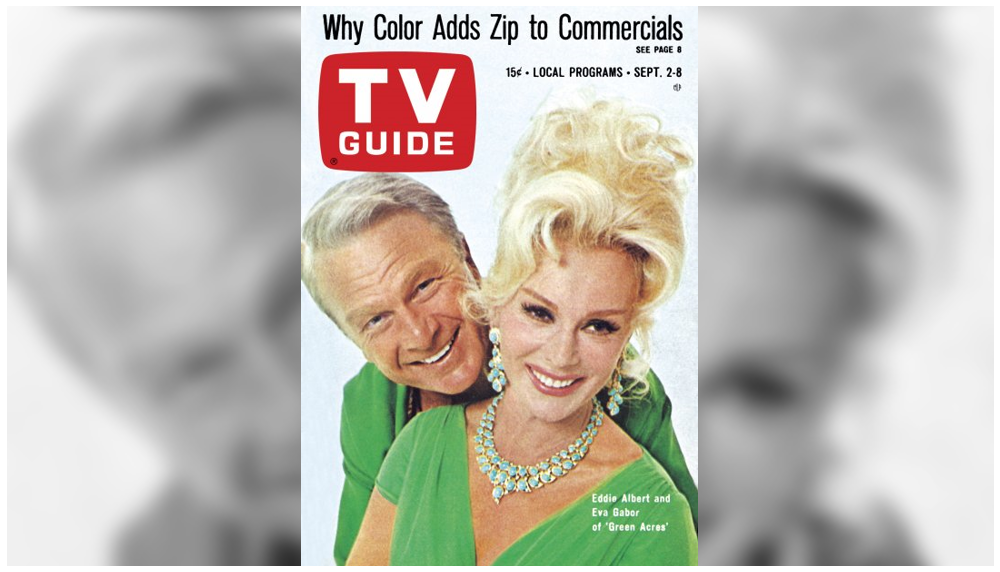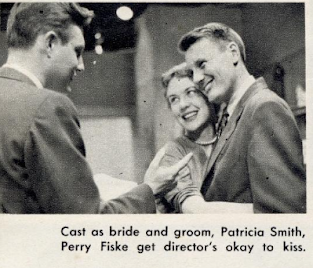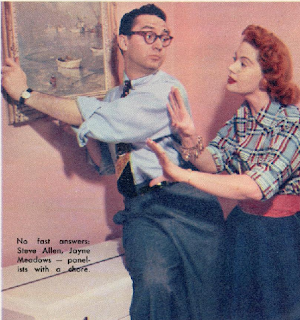ABC News has a problem: nobody watches its nightly news program. They hope they have the solution: Peter Jennings.
At age 28, the boy wonder is set to take on Walter Cronkite and Huntley and Brinkley as he assumes the reins of ABC's 15-minute evening news program.* Ron Cochran, who anchored ABC's news during the JFK assassination drama, has been shuttled off to radio, and in selecting the young Canadian who still has to remin
d himself that it's "lieutenant" and not "leftenant" and that the Marine band does
not play "Anchors Aweigh," ABC has passed over the likes of Howard K. Smith, Edward P. Morgan, and John Scali; all news veterans, all Americans.
*
While CBS and NBC expanded their newscasts to 30 minutes in 1963, it wouldn't be until 1967 that ABC would follow suit.
Jennings isn't really comfortable with the role (even less so with his name as part of the program's title (Peter Jennings with the News), and ABC had to accept his demands that he be allowed to travel to cover the news on location as much as possible. Still, just over six months into his term as anchor, it's clear that he'd rather be out in the field all the time; he sees himself not as an anchor, but as a reporter. "I'm a newsman," he tells Neil Hickey, and he's sensitive toward the impression, as someone put it, that he's the network's "glamorcaster." He's sanguine about it, though. "If I blow this show—and that possibility exists equally with the possibility that I'll succeed—I'm still young enough to come back and make another name for myself."
Indeed he is. Despite ABC's confidence in the young man, truth be told, his first stint as anchor is less than a success. He never really does make a dent in the ratings of the Big Two, and after three years he quits the anchor desk to become a foreign correspondent. It's there that Jennings shines, covering various crises in the Middle East, including the Munich Olympic massacre. He returns to the States briefly as anchor for ABC's failed morning program
A.M. America, after which he becomes the network's chief foreign correspondent. When ABC introduces
World News Tonight, he holds down the foreign desk in London, along with Frank Reynolds in Washington and Max Robinson in Chicago. After Reynolds' death in 1983, he once again assumes the anchor chair, and this time it sticks. He will remain on
World News Tonight, leading ABC to first place in the ratings, until his own death in 2005.
I wrote
a piece at the other blog a few months before Jennings died; at the time, he was considered part of the Big Three along with Dan Rather and Tom Brokaw. That's all well and good, I wrote then, but to tell the real story of Peter Jennings, one had to consider him "the last reminder of the era of Chet Huntley, David Brinkley, and Walter Cronkite," and added that "
That should put things in perspective."
Look at the picture of Jennings above: earnest, somewhat doubtful, painfully young. When ABC hired Jennings back in 1965, he was introduced as the network's answer to Cronkite, Huntley and Brinkley. As unlikely as it may have seemed back then, even to Peter Jennings, that's exactly the way it turned out.
l l l
 During the 60s, the
During the 60s, the Ed Sullivan Show
and The Hollywood Palace
were the premiere variety shows on television. Whenever they appear in TV Guide together, we'll match them up and see who has the best lineup.
Sullivan: Ed welcomes comedian Alan King; Metropolitan Opera soprano Birgit Nilsson; comics Marty Allen and Steve Rossi; singer Shari Lewis; the rock 'n' rolling Animals; impressionist George Kirby; South Vietnamese singer Bach Yenh; the Haslevs, trampoline artists; and Ravic and Babs, roller skaters. Also: Rex Harrison, Audrey Hepburn and Wilfred Hyde White in a clip from the movie version of
My Fair Lady.
Palace: Folk singer Burl Ives introduces Edgar Bergen, Charlie McCarthy and Edgar's 18-year-old daughter Candy; operatic soprano Anna Moffo; singer-dancer Ann Miller; comic Pat Henry; Rih Aruso, bicycle-balancer; and the Baranton Sisters, jugglers.
This is where we see Ed at his best. I know these shows weren't scheduled against each other when they originally aired, but it's as if Ed's playing "anything you can do, I can do better."
Palace has comedian Pat Henry? Ed tops them with Alan King. You want opera?
Palace has Anna Moffo; Ed counters with Birgit Nilsson. Academy Award-winner Burl Ives? What about Academy Award-winning film
My Fair Lady, with Oscar winner Rex Harrison to boot? Strangely-named foreign acts? How better to beat Rih Aruso then with Bach Yenh?
Palace has Ann Miller, Ed counters with The Animals.
Palace has a pretty good lineup, but Ed's is better.
Sullivan shows 'em who's boss.
And it's bonus week! Al Hirt, the summer substitute for Jackie Gleason, is back with another original lineup that in a lesser week might have taken top honors. Al's guests on Saturday night (6:30 p.m., CBS) include Liza Minnelli, country singer Johnny Tillotson, Little Richard and the Imperials, and Jackie Vernon. Even here,
Palace can't get a break; while they have Burl Ives, Sam the Snowman in
Rudolph the Red-Nosed Reindeer, in a few years Jackie Vernon will be the voice of
Frosty the Snowman. It's just one of those weeks.
l l l

Throughout the 60s and early 70s, TV Guide's weekly reviews were written by the witty and acerbic Cleveland Amory. Whenever we get the chance, we'll look at Cleve's latest take on the shows of the era.
I'm sure if we charged Cleveland Amory with being in full curmudgeon mode this week, our favorite critic would plead guilty, even with Perry Mason defending him. That's the show in the crosshairs, and Cleve acknowledges that "It would be nice to say that, after eight years on the air, the show has held up as well as Mr. Burr has." Alas, however, such is not the case, and Amory admits that "this is far from our favorite weekly hour."
At the outset, I'll stipulate that the Perry Mason of today is not the Perry Mason of the first few years. How could it be? There are only so many ways you can set up a courtroom drama, after all, and everyone involved in the show—the producers, the cast, and the freshness of the character—are that much older. Amory complains that many episodes are crammed not only with plots, but subplots and sub-subplots, and Burr himself had complained about needlessly complicated stories. And, adds Amory, "we've seen several plots here that we are convinced nobody believed—least of all the unfortunate actors who got the parts." Again, Burr himself would admit this is true. Amory doesn't quite accuse the actor of mailing his performances in, but he does suggest that Burr does his best acting in the opening credits. He still likes Barbara Hale and William Hopper, but he wishes Della Street and Paul Drake were in more of each episode.
So maybe Perry Mason isn't as good as it used to be. Maybe the stories are unbelievable, and the acting less than award-winning. But Cleve seems to ignore a central question: is the show still entertaining? There are shows I've given up on with only a season or two to go (Hawaii Five-O), and those I've stayed with to the end, with gritted teeth (77 Sunset Strip). In no instance have I ever been tempted to throw in the towel on Perry Mason, no matter how many times I've watched it. It is still entertaining—still fun, still comfortable, still better that most of the competition. If it's lost a step or two, well, then, so have I. To the accusation that I'm a fan of Perry Mason, I willingly plead guilty. But to the charge that, as Amory says, the show "can win, but lose winning," the verdict is: not guilty.
l l l
On Thursday night, CBS' legal drama
The Defenders presents "Eyewitness," in which E.G. Marshall defends "two youths who have openly committed murder—confident that no one would try to stop them." The "no one" includes 27 witnesses, "average citizens who didn't bother to interfere, shout for help or call the police."
The premise of "Eyewitness"—the 27 people who didn't want to get involved—bears obvious similarities to the 1964 murder of Kitty Genovese in which 38 witnesses saw the fatal attack on the 28-year-old barmaid, who was stabbed to death just outside her apartment building in the Kew Gardens neighborhood of Queens. Two weeks after the murder, The New York Times ran a front-page story on how 38 witnesses had seen the attack on Genovese and had ignored her cries for help, watching as the young woman died on the pavement after having been attacked three times by her assailant. The Genovese murder, and the attendant publicity created an international firestorm of publicity, as well as a cottage industry exploring the sociological study of what came to be known as the "Genovese Syndrome"; the case "became a staple of U.S. psychology textbooks for the next four decades." Books and articles were written, studies were conducted, movies were made. As the TV Guide close-up notes, "Incidents of public apathy toward crime in the streets are becoming shockingly frequent."
Except.
Not long after the initial story, questions began to be raised regarding accuracy of the Times coverage, particularly the claim that "38 witnesses" had seen or heard the attack and failed to do anything about it.* The story had been personally pushed by Times editor Abe Rosenthal, who saw an opportunity for the newspaper to capitalize on its sensational aspects. Indeed, the Times had been the main propellant in making the relatively obscure murder into an international story. However, such was the position and influence of Rosenthal that many journalists kept those questions to themselves. Gabe Pressman, a reporter for WNBC and later a journalism teacher, raised some of the doubts he'd heard, and was berated by Rosenthal.
*There never was any doubt as to the identity of the killer: Winston Moseley, who was convicted of the rape and murder of Genovese and confessed to at least one other murder. His death sentence was commuted to life imprisonment, and he died in 2016 at the age of 81, having served 52 years in prison—the longest of any New York state prisoner then incarcerated.
Over the years, doubts continued to accumulate, as researchers began assembling the pieces of disparate stories told by those who'd lived in the neighborhood, and compared them to the records of the police, the contemporary interviews with eyewitnesses, and the accounts appearing in the Times and other newspapers. Some people with first-hand knowledge of what had happened had never even been interviewed by police, and others said their comments weren't taken seriously.
Finally, in 2014, Kevin Cook's provocative book
Kitty Genovese: The Murder, the Bystanders, the Crime That Changed America exposed the holes in the "official record" and presented a story far closer to what actually happened. There were
never 38 witnesses to the crime; the number likely came from a "harried civil servant" who gave a number to the police commissioner who in turn passed it along to Rosenthal, who thought it would make a good story. There
was at least one phone call to the police, and perhaps more; the dispatcher never logged the call that is known to have been made. The attack took place near a bar where domestic arguments had been known to spill out into the street; some thought that's what was going on, while others couldn't make it out at all.
Genovese was actually attacked twice, not three times; Moseley fled when a man shouted at him from an open window but returned after Genovese rounded the corner to the rear entrance of her apartment building. That meant that, according to Cook, "most [witnesses] could no longer see her after just a minute or two. When there was nothing left to see, they went to bed and there was then a second attack." True, the one man who did see both attacks failed to call the police; according to Cook, he was a gay man who may have feared police persecution at a time when many organizations, including The New York Times, were inherently suspicious of homosexuals. (Although it wasn't made public until much later, Genovese herself was a lesbian.) In fact, Cook points out, no matter who you were, "It was a time when the police weren't necessarily your friend." And Genovese didn't die alone on the street; a neighbor ran out to comfort her and stayed with her until the ambulance arrived; she died on the way to the hospital.
In 2016, the Times appended an Editor's Note to the online version of its 1964 article, stating that, "Later reporting by The Times and others has called into question significant elements of this account," and printed a series of corrections, ultimately pronouncing the original story "flawed." More than one critic has suggested that the Times coverage would today be considered "fake news."
I wonder how The Defenders would have covered that story?
l l l
Thursday is also the scheduled date for the launch of Gemini V, the third manned Gemini flight. Rookie astronaut Pete Conrad is teamed with Gordon Cooper, a "veteran" who flew the final Mercury flight in 1963; he was also the last American launched on an entirely solo orbital mission.
We're far from the time when the public will take manned space flight for granted, and the networks are onboard for comprehensive coverage, beginning the night before the flight, when CBS (6:30 p.m. CT), ABC (9:30 p.m.), and NBC (9:45 p.m.) present previews of the flight and the goals of Project Gemini; the flight is scheduled for eight days, twice the length of Gemini IV, and approximating the time for the Apollo spacecraft to make its round-trip journey to the moon and back. Liftoff is to take place at 9:00 a.m. the following morning, with all three networks beginning their coverage at 6:00 a.m., and remaining on the air through the first few hours of the flight. Jules Bergman anchors for ABC, while Walter Cronkite and Mike Wallace do the honors for CBS, and NBC is led by Chet Huntley, David Brinkley, Frank McGee, and Merrill Mueller.
Just in case, though, the listings include alternate programming in the event the launch is postponed by a day or two, and it's a good thing it does, as the Thursday attempt is scrubbed due to a computer problem (a thunderstorm within a couple of miles of the launch pad might have resulted in a delay anyway). CBS remained on the air until 1:00 p.m., while ABC and NBC continued their coverage until 1:30. Everybody's back on Saturday, though, and the launch goes off without a hitch. Eight days later, the Gemini splashes down successfully, and the U.S. for the first time holds the record for the longest duration space flight.
While it's true that the Gemini V flight was an important step in the journey to the moon, it's still remarkable that the networks are providing so much coverage; Fred Friendly would later complain about what he called "an escalation just like the arms race," and said that with the exception of a manned flight to the moon, CBS would "no longer begin telecasting manned spaceflight coverage 'any earlier than a half-hour before launch.'" For Saturday's rescheduled launch, CBS would begin coverage at 8:30 a.m., 2½ hours later than NBC and 1½ hours after ABC. Setting aside the ridiculous way the all-news networks deal with even the most minor news story, can you imagine many events getting this kind of airtime today?
l l l
Finally, a quick look at "For the Record" and the industry gossip:
First off, Mia Farrow is about to marry Frank Sinatra (go figure on that one), and the question is how the producers of
Peyton Place plan to handle her absence while she's off on a cruise with Frank. Their answer: a hit-and-run accident that puts her character, Allison Mackenzie, in a coma. (One of those special four-week comas; ask for it the next time you're in the hospital.) If Farrow comes back from the cruise, as the producers expect, she'll snap out of it. If, on the other hand, she decides she'd rather be Mrs. Frank Sinatra instead, then—well, better off not thinking about it. (Don't worry, though: she pulls through in the end.)
Next, it's praise for Joey Bishop's performance as guest host for Johnny Carson on
The Tonight Show. The only blemish on the record may have been the show featuring Bishop's fellow Rat-Packers, Sammy Davis, Jr. and the aforementioned Frank Sinatra. Many of the critics thought Joey was fawning excessively (is there any other kind?) over Frank, but according to TV Guide, they missed the tongue that Bishop had firmly placed within cheek. Well, nobody ever went broke underestimating the intelligence of the average television critic.
Sadly, a survey of TV Guides of the era will see Vietnam start to play a more and more visible role in programming, as we see with CBS' four-part "Vietnam Examination," airing on consecutive Mondays for the next month. Not to be outdone, ABC is countering later in the month with "The Agony in Vietnam," while NBC's "White Paper" on foreign policy next month will devote substantial time to Vietnam. Before much longer, that's about all they'll be talking about. (In fact, ABC's Sunday afternoon program
ABC Scope will eventually be devoted exclusively to the war.)
And last but not least, some surprisingly hawkish comments from Hollywood on the war, which if nothing else shows how early in the conflict we really are. Raymond Burr, who's made more trips to Vietnam than anyone not named Bob Hope, is on an extensive speaking tour where he calls for an escalation against the Viet Cong; not surprising, considering his closeness to the American troops as a result of his visits. And Hope himself is congratulating Secretary of State Dean Rusk for speaking out on nations still doing business with North Vietnam. Says Hope, who's usually apolitical in things like this, "People seem to forget we're at war." They'll be remembering soon enough, Bob—trust me on that.
TV


































